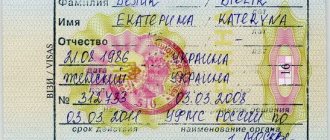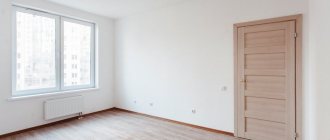Mandatory registration
Decree of the Government of the Russian Federation of July 17, 1995 No. 713 “On approval of the rules for registration and deregistration of citizens of the Russian Federation at the place of stay and place of residence within the Russian Federation and the list of persons responsible for receiving and transferring documents for registration to the registration authorities and deregistration of citizens of the Russian Federation at the place of stay and place of residence within the Russian Federation”, it is determined that everyone must be registered at the place of temporary stay or residence. Violation of this requirement may result in the imposition of administrative measures against the perpetrator. The responsibility for initiating the registration procedure rests with the person himself.
Types of registration accounting
By law, registration is divided into two types: temporary and permanent. That is, the classification depends on the length of stay at a particular address.
Permanent registration at the place of residence does not have a specific period. That is, a person can stay in the room and use it for an indefinite period. In this case, eviction is possible if the person himself intends to move to another address, for example, when selling an apartment. This can also happen at the initiative of the owner or tenant if the resident does not comply with the requirements of sanitary standards. There are often cases when the reason for a change of address is force majeure circumstances: war, natural disasters, illness.
Temporary registration is limited to certain periods. They are determined by agreement between the person and the owner or tenant. That is, the basis will be not only a person’s intentions, violations of the law or natural disasters, but also the expiration of the period of residence. This period is specified in the contract. It should be noted that after the expiration of the period, the person is obliged to vacate the home. Otherwise, eviction will be carried out forcibly, by decision of the court.
Does it make sense to buy an apartment: is it true that you can’t register there?
Photo: Valery ZVONAREV
What do the apartments look like?
Like an ordinary modern multi-storey residential building. The difference is on paper.
When did they appear in Russia? I've heard that's what they call expensive apartments.
— In the 90s, luxury housing began to be called apartments. Until now, our realtors call large apartments apartments to attract the interest of clients. The stereotype came from the West. In the USA and European countries, apart-hotels are popular - rooms rented out for long periods of time. They are often privatized and rented out. But we are talking about a special type of real estate that appeared in Russia in 2008. The apartment is classified as commercial, not residential real estate,” lawyer and real estate specialist Oksana Komarova told KP.
It is not clear about commercial real estate. This is some kind of store, what's the catch?
If you look at the cadastral map, all high-rise buildings and cottages, if they are legal, are located on land for residential development. The apartments are being built on land for hotels and public and business buildings. It is easier for businessmen to obtain such permission, plus it saves them from spending, which we will discuss below.
What does the developer save on?
— The developer is not obliged to provide residents of the apartment complex with kindergartens, schools, shops and other infrastructure. The process of obtaining a building permit is simpler. Therefore, apartments are built where residential buildings would not be built. For example, near industrial facilities or in the historical center. Developers choose the option that is convenient for them. The apartments are not subject to Sanitary Regulations and Regulations for residential premises. Therefore, the developer can make the windows smaller and the walls thinner,” explains Oksana Komarova.
Are there any other disadvantages?
Utility fees are 20% higher. There is no overhaul fee though.
The tax is higher - 0.5% (if it is a hotel type) or even 2% (if the apartments are part of offices) of the cost per year. For comparison, for a regular apartment we pay 0.1% tax per year.
Since this is non-residential property, the neighboring apartments can be bought and turned into a bar or office. The evening silence regime does not apply to them.
You cannot register in the apartment. Just make a temporary registration for a period of no more than five years. It does not impose any restrictions compared to a permanent one, but it needs to be extended.
You cannot receive a tax deduction when purchasing. They cannot be bought with maternity capital or a mortgage with state support.
Can I get a mortgage on them?
- It's possible. The registration procedure is somewhat more complicated than for ordinary residential premises and the percentage is higher. At the moment, apartment mortgages are not very common in Russia,” says lawyer Oksana Komarova.
Photo: Shutterstock
So many nuances! What is the benefit?
The difference in price with apartments is up to 30%. For example, one-room apartments are 10-15% cheaper than apartments of similar size. If we are talking about housing in the same area and of the same class. Like apartments, apartments come in business, elite and comfort classes. This affects the price.
Who is the apartment suitable for?
Firstly, for those who want to invest in real estate and rent it out. The apartment will cost less, and you can rent it out at a good price, considering that the house is new.
Secondly, young people may take a closer look at the apartments. After all, they are built not only in remote places, but also in business centers.
How many apartments are being built in Moscow and the regions today? Do they have any prospects?
A third of all new buildings in the capital are apartments. This is beneficial for developers, since there is no need to build social infrastructure. The price for them in Moscow is much higher than in the regions, so the business makes a profit. There is less land available for housing construction in the country, and developers always want to save money. Therefore, they will not abandon the construction of apartments.
— Apartments will continue to be built. However, the perspectives are abstract. Now it is fashionable and this fashion comes with pitfalls. The lack of strict requirements, the vagueness of the classification of objects - all this suggests problems for residents in the future. To solve the problems, it is necessary to define at the legislative level the criteria for apartments and the standards applicable to them, Komarova believes.
LISTEN ALSO
Where can I register?
In accordance with the requirements of the Law of the Russian Federation of June 25, 1993 No. 5242-1 “On the right of citizens of the Russian Federation to freedom of movement, choice of place of stay and residence within the Russian Federation,” each person independently decides where to actually live. This could be an apartment or a house. In this case, the property can be your own, in the possession of relatives, or rented out on a lease basis.
It should be noted that regardless of the ownership of the apartment or household, registration in it can be either temporary or permanent.
In your own home
Living in your own home is the best option. In this case, a person independently determines his address, since an apartment or home ownership can be purchased, inherited, by exchange or gift in any region of the country. In this case, you do not need to coordinate your decision with anyone. The only condition in this situation is timely registration.
With relatives
There are often cases when a person lives with his relatives. Most often this concerns elderly or disabled people who cannot take care of themselves. This may also be due to admission to an educational institution, employment, or recommendations from a physician. Registration in this case is possible if there is nowhere else to register, you just need to coordinate your actions with relatives, since the owner or tenant must agree to live together.
In a rented apartment
People can live in an apartment or house on a rental basis. This option involves concluding an agreement. It should be noted that renting housing is most often associated with temporary registration. That is, a person’s residence is limited to certain periods, after which he will be obliged to vacate the occupied premises. You can register in a rented apartment if there is no other housing. In this case, registration is possible with the consent of the owner.
In the Central Administrative District without registration
Apartments are non-residential premises that can be used for living. But the word “non-residential” does not mean that you cannot live in them: most often, in appearance they are no different from apartments. However, unlike apartment residents, the apartment owner cannot count on registration and permanent registration. This means that he will not have the opportunity to obtain a tax identification number, use health insurance, or participate in government programs to improve living conditions. In addition, it will be possible to enroll a child in school and kindergarten only on a first-come, first-served basis, after places have been distributed among those who have permanent registration.
Apartments are not subject to standards for housing construction: the developer is not obliged to provide such neighborhoods with social infrastructure, and the building density of apartments can exceed 25 thousand square meters. m per hectare. Another important difference between apartments and apartments is that they are not subject to Federal Law No. 214 “On Participation in Shared Construction,” which means that shareholders cannot be considered victims if problems arise.
Initially, the word “apartment” meant expensive real estate for the temporary residence of wealthy people. “More than half of the apartment complexes are located within the Central Administrative District, and these are mainly elite or business class projects,” said Irina Mogilatova, general director of the Tweed real estate agency . Their appearance was due to the fact that there was no room left for housing construction in the center of the capital. For buyers of luxury real estate, neither registration nor social infrastructure most often mattered. Such housing was not purchased for permanent residence, and the most important thing was its location in the Central Administrative District.
Article on the topic
The fall of the ruble. How prices will change in the real estate market
However, since last year the situation has changed. “Over the past year, low-price segment properties began to actively enter the market. At the same time, sales analysis shows that there is a high demand for these products,” says Alexander Engel, head of the new buildings department of the MIC Group of Companies .
Registration conditions
The procedure for registering a person at the actual address is determined by Decree of the Government of the Russian Federation of July 17, 1995 No. 713 “On approval of the rules for registration and deregistration of citizens of the Russian Federation at the place of stay and place of residence within the Russian Federation and the list of persons responsible for receiving and transfer to the registration authorities of documents for registration and deregistration of citizens of the Russian Federation at the place of stay and at the place of residence within the Russian Federation.” The determining factors in this case are: housing status, person’s age.
In a private home
Registration in private real estate has its own nuances. It all depends on whose ownership it is. If the housing belongs to the person registering, then a passport, application and title documents will be sufficient for registration. The latter include a purchase and sale agreement, a certificate of ownership, an extract from the Unified Register of Real Estate. If the premises are owned by another person, then an application, a passport, a document for the right to move in, for example, a rental agreement, as well as the consent of the owner will be required.
It should be noted that a positive response from the owner is not required if the registration concerns children, provided that parents or persons replacing them are registered in this premises. At the same time, children who are under fourteen years old cannot be registered at another address. They must register with their parents or guardians. If the question concerns children over fourteen, who are registered separately, in addition to the consent of the owner, a positive answer from their legal representatives will also be required.
In public housing
A municipal apartment has a special status. It doesn't actually belong to a person. Therefore, the procedure for moving in is somewhat different from registration in private housing. For children who will live in municipal accommodation, the same rules apply as in the case of private housing. That is, persons under fourteen are registered together with their legal representatives.
If older children will live separately, the consent of parents or guardians is required.
A distinctive feature in this case is the fact that if a person over fourteen years of age intends to live separately from his legal representatives, then, in addition to the consent of the latter, a positive response will also be required from the tenant of the premises, as well as from all those living with him, including temporarily absent.
To register, the initiator will have to present his passport, application, document giving the right to move in.
How do I register for my own premises after purchase?
Migration issues are dealt with by the Main Directorate for Migration of the Ministry of Internal Affairs. Documents can be submitted in person, through the MFC or the passport office of the Criminal Code. You can also fill out the application yourself on the State Services portal. You need to take several standard steps to register in your own apartment :
- To change your registration, you must check out from your previous place of residence and receive a departure sheet. If, during registration, you indicate a request for an extract in the application, then it is not necessary to register first. The registration authority will take care of this on its own.
- Appear at the territorial department of the Main Department of Migration Affairs of the Ministry of Internal Affairs (or another institution where registration is possible) at your new place of residence and fill out application No. 6.
Minor children under fourteen years of age cannot fill out and complete the application on their own. Their legal representatives do this for them. Attention ! Documents must be attached to the application (passport, ownership of the apartment, departure certificate, etc.). - Wait until the employee finishes checking the application and submitted documents. Then he must take your passport and set a day for returning the document. Registration usually takes no more than three to seven days.
- On the appointed day you need to pick up your passport with a new stamp.
After completing all of the above procedures, you are considered officially registered in your new home.
You should remember the nuances associated with registration in apartments and studios.
Registration in the purchased property is not a mandatory procedure . The main thing is that you have a permanent place of residence where you are registered, since the lack of registration is punishable by law. However, for owners of residential space, registration gives the right to use municipal services, open and register an individual entrepreneur, and much more. For ordinary cohabitants, registration is only formal.
Is it possible to live without registration?
Each person is required to register at the place of residence or actual location. This rule is determined by law. In case of violation, the perpetrator will bear administrative liability. However, despite this requirement, a person can still live without registration for some time. The duration of this period depends on the type of registration.
Deadlines
There are certain deadlines for registration. Their duration depends on the type of registration.
If a person permanently resides at a new address, he is obliged to contact the territorial unit of the Ministry of Internal Affairs within seven days from the date of arrival. That is, in this case, you can actually live for a week without registration. At the same time, a person is not responsible for failure to register until the registration procedure is completed, which is carried out within three days. That is, the period of stay without a mark will increase by a few more days.
For temporary registration, other deadlines are defined. If a person intends to live at a certain address for more than ninety days, then he is obliged to contact the territorial body of the Ministry of Internal Affairs before the expiration of the specified period. That is, in this case, you can live without registration for three months, as well as for the entire time until the end of the registration procedure.
Responsibility
Living without registration has serious consequences and involves the application of administrative measures to the culprit. They are expressed in the imposition of a monetary fine on the violator. In this case, the punishment applies not only to the resident himself, but also to the owner of the property, including a legal entity, and the tenant of the municipal premises.
In this case, liability occurs if a number of conditions are met. First of all, a person must reach a certain age. The offender must be over sixteen years of age. If he is younger, then his legal representatives will be held accountable. Then the fact of the violation itself must take place, that is, the person must violate the established registration deadlines. Finally, there must be guilt. That is, the offense became possible due to the fault of the resident himself. For example, if a person submitted all the necessary documents, properly executed, and the specialists of the Ministry of Internal Affairs violated the deadlines for registration, the initiator is released from liability.
Also, measures of influence are not applied to persons who were in a state of insanity, that is, they were not aware of their actions and could not control them.
Amount of fine
The sanctions that apply to those responsible are specified in Article 19.15.1 of the Code of Administrative Offenses of the Russian Federation. A financial fine is imposed on the violator.
In this case, a person will be required to pay from two to three thousand rubles, an employer or owner - from two to five, a legal entity - from two hundred and fifty to seven hundred and fifty. Living without registration in cities of federal significance, Moscow or St. Petersburg, threatens a person with a fine of three to five thousand, the owner or tenant - from five to seven, an organization - from three hundred to eight hundred.







